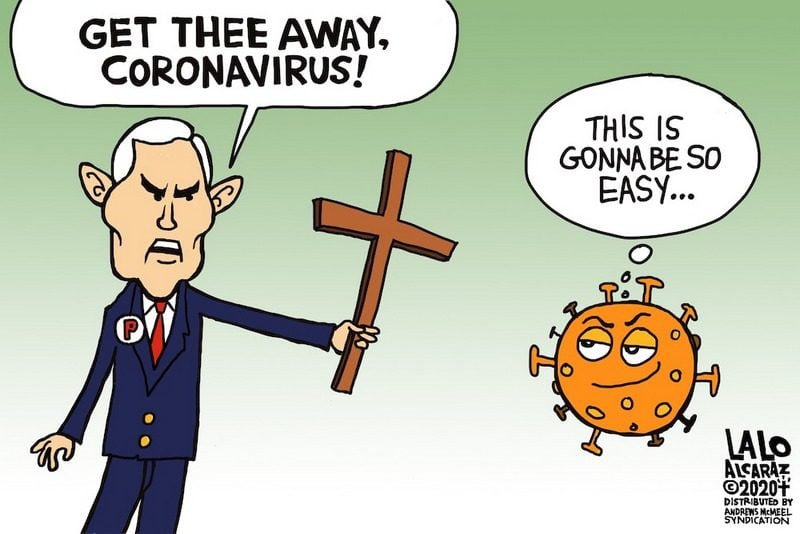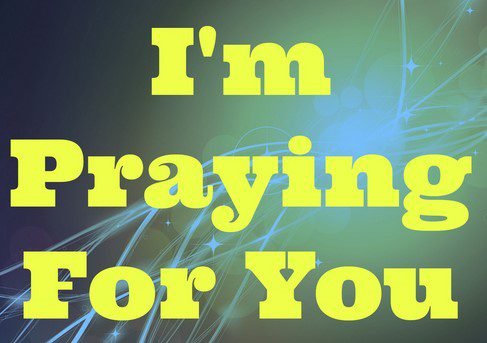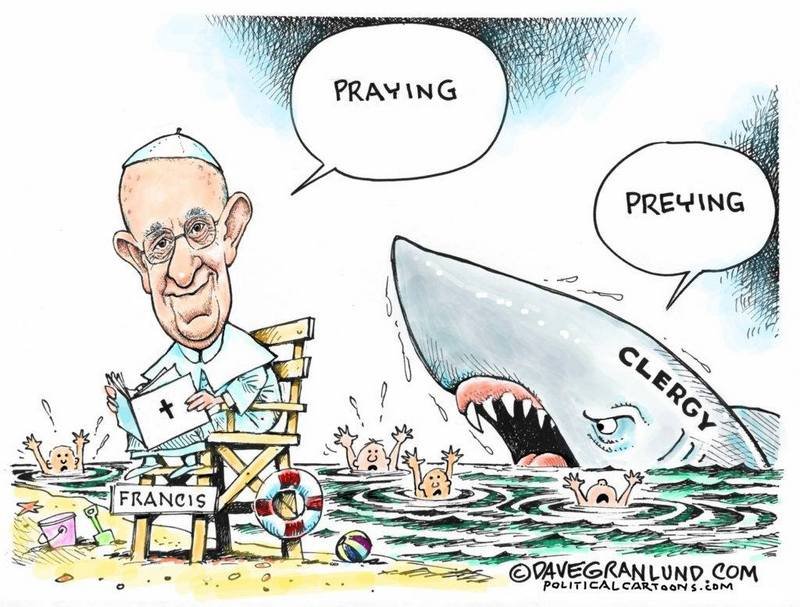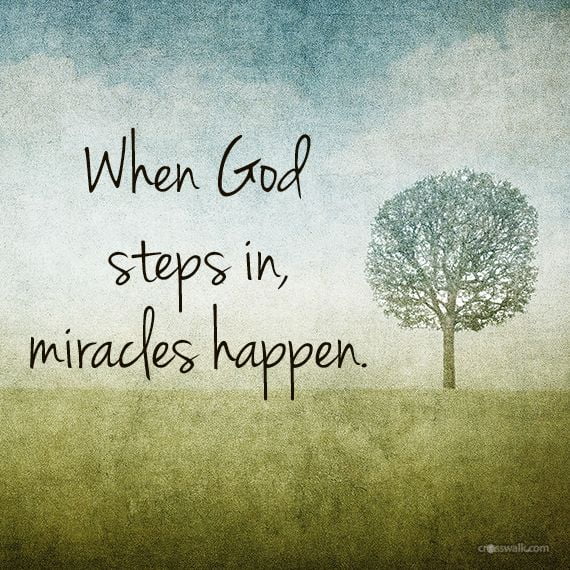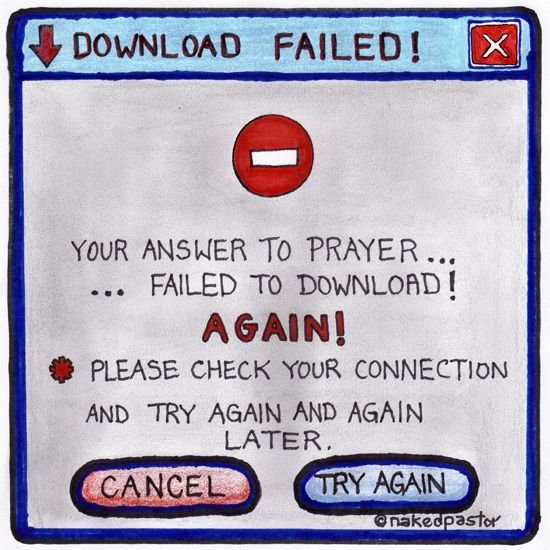
Repost from 2015. Edited, rewritten, and corrected.
From the earliest age, I was taught to pray. As a child I prayed, Now I lay me down to sleep, I pray the Lord my soul to keep, and if I die before I wake, I pray the Lord my soul to take. Bless Mommy, Daddy, Bobby and Robin, and the pastor and the church, Amen. As I got older, I learned to pray extemporaneously. Prayer was God and me conversing with each other. As I matured in the faith, I came to believe that the divine purpose of prayer was to conform my will to God’s will. I thought it was proper and right to pray as Jesus did in the Garden of Gethsemane, Lord, not my will, but thy will be done. On earth as it is in Heaven.
As a pastor and a married man with six children, I spent much time in prayer. Hours and hours a week were devoted to praying. I started and ended each day with prayer. I prayed throughout the day. I prayed over every meal, and I prayed before and after each of the thousands of sermons I preached. I prayed before, during, and after every time I preached on the street. I spent thousands of hours in church prayer meetings. Needless to say, I have a good bit of experience when it comes to praying.
I believed God answered every prayer I prayed in one of three ways:
- Yes
- No
- Not now
It was not until I had left the ministry that I began to seriously look at praying in general and specifically the prayers that I had prayed over the course of fifty years in the Christian church and twenty-five years as a pastor.
I know that many people benefit from praying. They find it soothing and comforting to pray to a God. They find strength from taking their troubles and burdens to the Lord. Even if God doesn’t exist, prayer, at least for them, is still beneficial, often bringing peace, comfort, and direction. I don’t criticize people for praying, and I certainly don’t ridicule them. If praying helps get them through the night, who am I to condemn or mock them? God needn’t be real for people to find help and solace through prayer. I know to rationalists and atheists, such a thought sounds absurd, but religion has left a deep imprint on humankind, and praying to a deity is very much a part of the lives of billions of people.
Several years ago, I sat down and carefully considered all the prayers I had prayed. There were some big prayers I prayed asking God to deliver people, save people, keep them from dying, restore marriages, elect certain people to office, end abortion, etc. I prayed for my personal needs, financial needs, physical needs, and the needs of my wife, children, and extended family. I prayed for the church I pastored. I prayed it would grow and that we would see many souls saved. I prayed God would send us new members, people with a servant’s heart, ready and willing to get busy for God.
Did God answer my prayers? How could I know? Since God could say yes, no, or not now to every prayer I prayed or get me to modify my request, so my will lined up with his, how could I ever know if God ever, actually, one time, answered a prayer of mine?
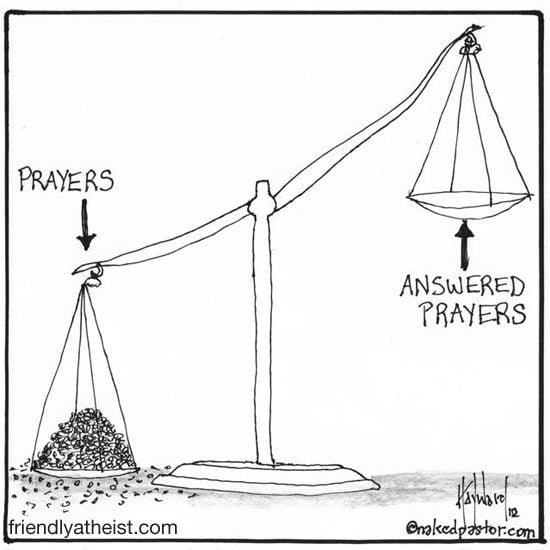
Christians tend to think that proof of God answering prayer occurs when something they perceive as good happens to them. They get sick and they pray that God will make them well, and sure enough they recover. Thus, God healed them. Money is tight and they ask God to get their employer to give them a raise, and sure enough they get a raise. It’s God that gave them a raise. Since God is good all the time, when good things happen it is God’s doing.
What about when bad things happen? Is God behind the bad things that happen, as in the case of Job? Shouldn’t God get credit for everything that happens to Christians? Since God is sovereign and in control of the universe, shouldn’t the placard on God’s desk say, The buck stops here? This is a thorny, troublesome issue for Christians. They don’t like blaming God for the bad things of life so they come up with different ways to excuse God:
- The Romans 8:28 excuse And we know that all things work together for good to them that love God, to them who are the called according to his purpose.
- The James 1:12-15 excuse Blessed is the man that endureth temptation: for when he is tried, he shall receive the crown of life, which the Lord hath promised to them that love him. Let no man say when he is tempted, I am tempted of God: for God cannot be tempted with evil, neither tempteth he any man: But every man is tempted, when he is drawn away of his own lust, and enticed. Then when lust hath conceived, it bringeth forth sin: and sin, when it is finished, bringeth forth death.
- The Romans 9 excuse So then it is not of him that willeth, nor of him that runneth, but of God that sheweth mercy. For the scripture saith unto Pharaoh, Even for this same purpose have I raised thee up, that I might shew my power in thee, and that my name might be declared throughout all the earth. Therefore hath he mercy on whom he will have mercy, and whom he will he hardeneth. Thou wilt say then unto me, Why doth he yet find fault? For who hath resisted his will? Nay but, O man, who art thou that repliest against God? Shall the thing formed say to him that formed it, Why hast thou made me thus? Hath not the potter power over the clay, of the same lump to make one vessel unto honour, and another unto dishonour.
- The Hebrews 12 excuse And ye have forgotten the exhortation which speaketh unto you as unto children, My son, despise not thou the chastening of the Lord, nor faint when thou art rebuked of him: For whom the Lord loveth he chasteneth, and scourgeth every son whom he receiveth. If ye endure chastening, God dealeth with you as with sons; for what son is he whom the father chasteneth not? But if ye be without chastisement, whereof all are partakers, then are ye bastards, and not sons. Furthermore we have had fathers of our flesh which corrected us, and we gave them reverence: shall we not much rather be in subjection unto the Father of spirits, and live?
What do these four excuses tell us about bad things and their relationship to God?
- There are no bad things. God means everything for the good of the Christian. Things perceived as bad are really good since their objective is to make one a better Christian.
- That God chastens (spanks, whips, disciplines, corrects) Christians so that they might be better Christians. Once again, bad things happening are really just God getting the Christian’s attention.
- Enduring perceived bad things from the hand of God will result in a reward from God when Christians get to Heaven.
- Questioning God’s dealings with Christians is not permitted. God can do whatever he wants. He is, after all, God. He created everyone, so he can do whatever he wants with us. So what if it seems God is being evil and malicious towards us. He has the power, authority, and right to do so. Besides, God is good all the time and he means it for their . . . let the circular reasoning continue.
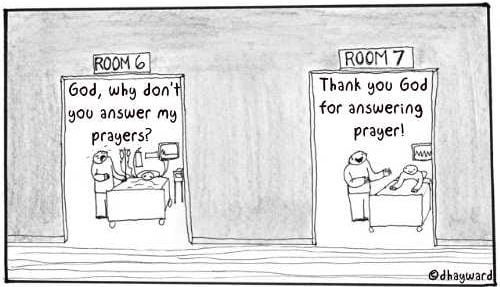
Now back to my own prayers. WHY always lurked in the background. WHY is this happening? What is God trying to say to me? Is God judging me, teaching me, chastising me, building me up, tearing me down . . .? You know the drill.
Why did God lead me to leave a church I pastored for eleven years and move to Texas? Why did God then change his mind after seven months? Why did God lead me to sell some prized possessions I owned so I could help a family move from Texas to Ohio only to change his mind and have that same family move right back to Texas three months later? These are but two of a number of stories I could share about God, through prayer, leading me to do this or that, only to change his mind a few days, weeks, or months later.
When I took a big step back and began to look at my prayers and their connection to God, I came to see there was no connection at all. Good and bad things happen to everyone. It doesn’t matter whether a person prays. Shit happens, and that shit is called life. Praying changes nothing. It may help people feel better or give them peace, but in the morning whatever they are praying about is still there for them to face.
Praying often becomes an excuse for not dealing with life. Making a decision can be offloaded to God, and that way whatever happens is God’s will. Instead of owning the decision, God gets all the credit — that is, unless something bad happens, and then the Devil or the flesh gets the credit (even though, according to the Bible, the Devil operates under the control of God).
This seems quite maddening to me. I like my current view of life much better. Good and bad things happen. Good and bad decisions are made every day. Luck plays a big part in life. Bad things happen to good people and good things happen to bad people. I am responsible for the decisions I make and I cannot control the decisions other people make. My new perspective on life has forced me to reevaluate the leading of God in the past. If it wasn’t God leading me or God answering my prayer who was it?
Me. That’s right, me. I did what I wanted to do. I may have couched my decisions in Christian-speak, but I was the one making the decisions. There is no imaginary God to blame and no imaginary God to praise. The only God in the equation is of human form. Take the two illustrations I gave above.
I left a church I started and pastored for eleven years and moved to Texas. I became the co-pastor of a young, exciting, growing Sovereign Grace Baptist church. I saw this as my once-in-a-lifetime move. My wife and I were excited about God “leading” us to this church. Yet, seven months later, we were back in Ohio, bruised, battered, and abused. We had our hearts ripped out. The church even went so far as to excommunicate me and to this day they consider me a “publican and heathen” (Matthew 18). What went wrong? Did I “mishear” God? Did God just want to move me to Texas so he could give me an ass-whipping? (See I am a Publican and a Heathen.)
The truth is we should never have moved. The new church offered me a pay increase that doubled what I was making in Ohio. They offered us a new mobile home to live in, rent and utility free. I saw it as a golden opportunity, a chance to get out of the financial hole we were in. I also saw the move as an opportunity to put my evangelism skills to good use. Everything about this move said . . . YES! YES! YES!
However, I ignored the character, personality, and temperament of the man I was going to work with. He started the church and, while I was going to be co-pastor, there was no doubt who was the REAL pastor. This man was just like me. Driven. Strong-willed. Bull-headed. Arrogant. Temperamental. Prone to anger. Certain of his beliefs. It took me all of a few weeks to realize that the church wasn’t big enough for both of us, and over the course over the next six months I lived just this side of Hell. In the end we fought and bickered like a couple of tom cats. We had no love or respect for each other. It was ugly and I am just as guilty in all of this as the other man. So much for a Christianity of love, peace, joy and understanding.
Take the other illustration I gave. Why did God lead me to sell some prized possessions I owned so I could help a family move from Texas to Ohio only to change his mind and have that same family move right back to Texas three months later?
This one is easier to parse. You see, this family was part of the church I was excommunicated from (though they had left it a short time after we moved away). Since God was “leading” them to move to Ohio and I felt “led” to help them, I did everything in my power to help them move. I spent $2,000 helping them move, including going to Texas to help them make the move. I had to sell several prized possessions so I could get the money necessary to help them move. One item I sold was a bolt-action Mossberg .410 shotgun. I bought it new when I was twelve years old for $22. The gun had special meaning to me, BUT God had a work for me to do so I sold it, along with several high-powered rifles, shotguns, and a handgun.
Those of you on the outside looking in can see what was going on in this story. This wasn’t God “leading” . . . it was me getting back at the pastor I had a falling out with and the church that excommunicated me. The family moved to Northwest Ohio, only to moved back home three months later. Why didn’t they stay? They were Hispanic, and they had just moved from racially diverse San Antonio to Anglo rural Ohio. The culture shock was overwhelming. I had talked to them about this before they moved and they were sure they could handle it. Everything about Ohio was different from the Hispanic culture they moved from. I don’t know what happened after they moved back to San Antonio. I heard they went back to the church and pleaded for forgiveness. Perhaps they repented of following after the evil Bruce Gerencser. I wonder how things are for them.
I tell these stories to illustrate the fact that in each of these cases I was certain that God was leading me and answering my prayer. I have come to see that throughout my Christian life that it wasn’t God leading the way at all. It was me. Was God leading me to go to a Christian college or was it that I wanted to be a pastor and I needed a college education to do that? Did God lead my wife and me to get married or did we get married because we were physically and emotionally attracted to each other? Every church I ever pastored grew numerically. Was that God’s doing? Was God answering my prayers for power from on high? Or did the churches grow because I worked hard, was a friendly pastor, and a pretty darn good public speaker?
As I look at every major decision I ever made that I attributed to God, I can see the hand of Bruce and the influence of other people. If it is God answering prayer then I have finally figured out who God is . . . I am.
I am sure my critics will take this post as the best proof yet that I never was a Christian. They now have proof that I had a man-powered, man-centered ministry and life. I even said I was God! What they blindly cannot or will not see is that their lives are no different from mine. I am not some special case. I am, in every way, a typical example of a person who devotedly followed after Jesus, and who one day woke up and finally realized that most of what he spent his life doing was predicated upon a fantasy.
All cartoons by David Hayward, the Naked Pastor
Bruce Gerencser, 66, lives in rural Northwest Ohio with his wife of 45 years. He and his wife have six grown children and thirteen grandchildren. Bruce pastored Evangelical churches for twenty-five years in Ohio, Texas, and Michigan. Bruce left the ministry in 2005, and in 2008 he left Christianity. Bruce is now a humanist and an atheist.
Connect with me on social media:
Your comments are welcome and appreciated. All first-time comments are moderated. Please read the commenting rules before commenting.
You can email Bruce via the Contact Form.

